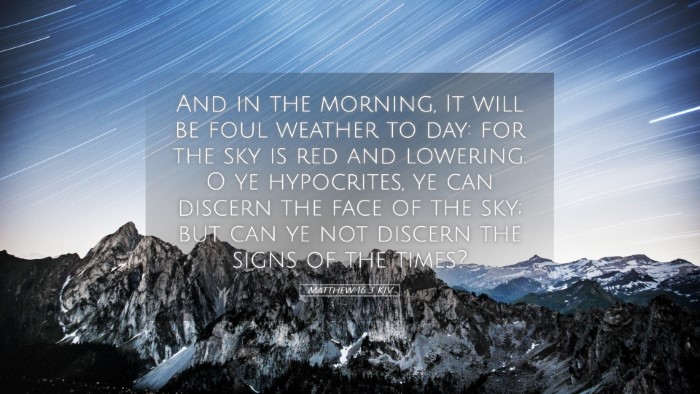Commentary on Matthew 16:3
In Matthew 16:3, Jesus addresses the Pharisees and Sadducees, emphasizing their ability to predict the weather yet their failure to discern the spiritual climate represented by His coming. This verse captures a profound moment in which Jesus critiques their spiritual blindness—a theme that resonates throughout the Gospels.
Text of Matthew 16:3
“And in the morning, It will be foul weather today: for the sky is red and lowering. O ye hypocrites, ye can discern the face of the sky; but can ye not discern the signs of the times?”
Contextual Analysis
To fully appreciate this verse, one must consider the broader context of Matthew 16. In the preceding passages, Jesus had performed numerous miracles and taught with authority, yet the religious leaders demanded signs from Him to authenticate His ministry.
This desire for signs is rooted in disbelief and represents an ongoing theme of resistance against Jesus’ authority. Instead of recognizing Jesus as the Messiah and the fulfillment of Old Testament prophecy, they were focused on their traditions and interpretations of the Law.
Insights from Commentaries
Matthew Henry's Commentary
Matthew Henry highlights the hypocrisy of the religious leaders. He emphasizes that they were experts in interpreting natural signs but were incapable of recognizing the spiritual signs that were evident in Jesus' ministry. Their scrutiny of external phenomena contrasted sharply with their blindness towards divine revelation. Henry notes that Jesus rebukes their inability to "discern the signs of the times," which pointed towards the coming of the Kingdom of God.
Albert Barnes' Notes on the Bible
Albert Barnes elaborates on the phrase "signs of the times," explaining that it refers to the prophecies and events that indicate the fulfillment of God’s plan through the arrival of the Messiah. Barnes underscores that the Jewish leaders’ failure to discern these signs reveals their spiritual negligence and heart of unbelief. He goes on to argue that their inability was not due to a lack of evidence but to an unwillingness to accept the truth revealed in Jesus.
Adam Clarke's Commentary
Adam Clarke provides a thorough examination of the cultural implications of the Jewish leaders’ request for signs. He points out that their skepticism stems from a deeply ingrained tradition that prioritized human reasoning over divine revelation. Clarke suggests that this moment serves as a dichotomy between faith and skepticism, highlighting how religious leaders can become so entrenched in their interpretations that they miss the very presence of God among them. He urges believers to be vigilant in recognizing the work of God in their midst, lest they too fall into a similar trap of spiritual blindness.
Theological Implications
Matthew 16:3 presents crucial theological implications regarding the discernment of spiritual truth. It challenges pastors, students, theologians, and scholars to reflect on their own capacity to recognize God’s presence and action in the world. The warning against hypocrisy is clear: it is not enough to be knowledgeable in scripture or tradition; one must also be sensitive to the workings of the Holy Spirit.
-
Discernment: The ability to discern the signs of the times is a call for spiritual vigilance. Believers are urged to cultivate discernment through prayer, scripture study, and openness to the Holy Spirit’s leading.
-
Hypocrisy: The indictment of the Pharisees serves as a reminder for contemporary leaders to avoid the pitfalls of hypocrisy. Authentic faith is evidenced by actions that align with an understanding of God’s truth, rather than mere lip service or adherence to tradition.
-
Recognition of Christ: The challenge presented in this passage is to recognize Christ in all His fullness—His authority, His teachings, and His redemptive work. Discerning the truth of Christ requires not just intellectual acknowledgment but also a genuine heart response.
Final Reflections
In conclusion, Matthew 16:3 serves as a profound reminder of the need for spiritual discernment among the faithful. It critiques the tendency to prioritize external signs while neglecting the deeper spiritual realities that God has made manifest through Jesus. As pastors, students, and scholars, it is essential to cultivate an awareness of Christ's presence and work, continuously seeking to align our understanding and actions with His will.
The exhortation to discern the signs of the times is an urgent call, urging believers to remain vigilant, active, and responsive to the divine revelations that shape our understanding of faith and practice today.


